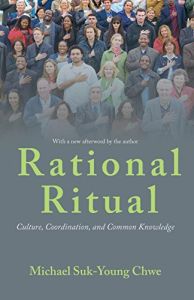Join getAbstract to access the summary!

Join getAbstract to access the summary!
Michael Suk-Young Chwe
Rational Ritual
Culture, Coordination, and Common Knowledge
Princeton UP, 2013
What's inside?
How do you know that I know what you know? What does common knowledge mean?
Recommendation
Michael Suk-Young Chwe, a professor of political science at UCLA and the author of Jane Austen, Game Theorist, tackles important, even crucial, questions regarding the modern knowledge-based economy and how societies work. Stated in abstract terms, some questions can sound pretty philosophical, such as “How can you know what I know?” But, Chwe grounds these abstractions in concrete examples, like antiwar protests, advertising and the Super Bowl. For an academic book, his brief exploration is quite clearly written. However, it is still an academic text, and can be slow going at times. Still, getAbstract recommends Chwe’s intelligent explorations to anyone interested in theories of knowledge, culture, community creation or meaning.
Summary
About the Author
Michael Suk-Young Chwe is professor of political science at UCLA and the author of Jane Austen, Game Theorist.

















Comment on this summary